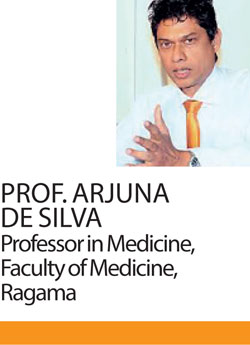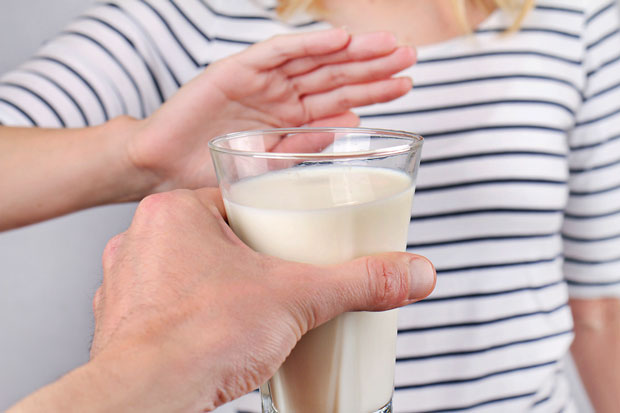15 Sep 2017 - {{hitsCtrl.values.hits}}
 Have you ever wondered why you get cramps or gassy after drinking a cup of milk or eating yoghurt? It isn’t because you are allergic to milk or dairy as a whole, but because as you grow older you become more lactose intolerant. Lactose intolerance is a condition that everyone is liable to experience. As it is quite manageable through a change in diet, the condition isn’t considered to be serious. Speaking to Professor Arjuna de Silva, Professor in Medicine, Faculty of Medicine, Ragama the Health Capsule learned a great deal about lactose intolerance and how it occurs.
Have you ever wondered why you get cramps or gassy after drinking a cup of milk or eating yoghurt? It isn’t because you are allergic to milk or dairy as a whole, but because as you grow older you become more lactose intolerant. Lactose intolerance is a condition that everyone is liable to experience. As it is quite manageable through a change in diet, the condition isn’t considered to be serious. Speaking to Professor Arjuna de Silva, Professor in Medicine, Faculty of Medicine, Ragama the Health Capsule learned a great deal about lactose intolerance and how it occurs.
Definition
Lactose is a sugar found in milk and other dairy products such as yoghurt. According to Professor de Silva there is an enzyme that is called lactase, produced in the small intestine, that acts for the break down and digestion of lactose. “Lactose intolerance happens when the body can’t easily digest lactose. All children are born with the enzyme lactase. However, in some cases, it can be completely absent. As we grow older we become more lactose intolerant because we produce less of the enzyme. This is a very common phenomenon. It is very rare to see a child born completely deficient of the enzyme. It isn’t a very serious condition and is quite easily manageable with changes to one’s diet,” Prof. de Silva explained. He added that Lactose intolerance is very common among Asians rather than Caucasians. According to him, people in countries that are close to the equator are more lactose intolerant than those further away.
 Intolerance
Intolerance
Prof. de Silva went on to explain why we become more lactose intolerant as we age. “It is because we are continually evolving. Normally only children are supposed to drink milk. We are the only mammals who drink milk as adults. Which is why our bodies are supposed to produce less of it as we age. Thus, older people who are fond of milk and dairy products will experience lactose intolerance. Lactose intolerance can even be genetic,” he said.
He further stated, “In some people the deficiency is more prominent than in others. Very rarely is it congenital. Those who experience the deficiency prominently usually won’t be able to tolerate milk at all. Others can eat or drink small amounts of milk or dairy products without a problem. Sometimes people might even experience irritable bowel, but that isn’t always due to lactose intolerance,” he said.
Speaking of the difference between a milk allergy and lactose intolerance, Prof. de Silva stated that the mechanisms for the two are very different as lactose intolerance deals with the deficiency of the enzyme.
Symptoms and diagnosis
Speaking about the symptoms Professor. de Silva said, “ When your body can’t break down lactose then the bacteria in the blood starts to break it down, which is when you experience various symptoms. Symptoms include, cramping, vomiting, bloating, gas etc.
“Diagnosis is generally clinical. You can go to a doctor and describe your symptoms and he or she may ask you to avoid dairy products for a short period of time to see if it is the cause for the symptoms. Otherwise it can be diagnosed through tests such as the lactose breath test,” he said.

Treatment
Prof. de Silva further stated that there is no cure for lactose intolerance, but people can treat the symptoms. This can be done by limiting or avoiding milk products or even switching to substitutes. “People who experience this condition prominently have to make dietary changes. Such people will have to reduce the amount of yoghurt, milk or any dairy products they consume. They will have to move to alternatives such as soy milk and almond milk or any other non dairy substitute,”said Prof. De Silva.
Another problem that occurs is that when one removes milk products from the diet they are also removing a large source of calcium. “Substitute food sources that are rich in calcium are things like kathurumurunga, sprats, small fish etc. These people can even get their calcium through calcium tablets. People who generally need a sufficient amount of calcium in their diet are pregnant women, women who are breastfeeding and post menopausal females,” he further said.
One of the biggest challenges people who are lactose intolerant face is changing their dietary habits and learning how to select meals that don’t put them in discomfort.
23 Dec 2024 1 hours ago
23 Dec 2024 3 hours ago
23 Dec 2024 6 hours ago
23 Dec 2024 7 hours ago